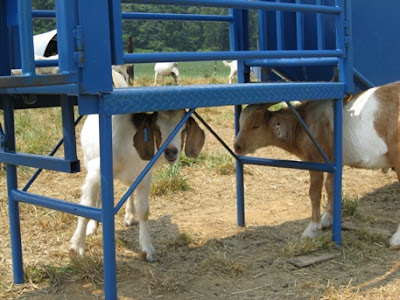 The goats were re-weighed. For the purpose of determining growth performance (average daily gain/ADG), the June 22nd weight will be utilized. The first 13 days of the test will be considered an adjustment period, as the goats adjusted not only to a new place and each other, but a new diet. However, most of the goats did gain weight during the first 13 days; only 8 lost weight. The group average was + 0.175 lbs. per day.
The goats were re-weighed. For the purpose of determining growth performance (average daily gain/ADG), the June 22nd weight will be utilized. The first 13 days of the test will be considered an adjustment period, as the goats adjusted not only to a new place and each other, but a new diet. However, most of the goats did gain weight during the first 13 days; only 8 lost weight. The group average was + 0.175 lbs. per day.The goats will be worked next on Friday, July 6. FAMACHA© and body condition scores will be determined. Goats scoring 4 or 5 on the FAMACHA© scale will be dewormed, while those scoring 1 or 2 will not be dewormed. The decision to deworm goats with FAMACHA© scores of 3 will be based on additional factors, such as BCS, ADG, and previous scores. Few, if any, of the goats should require deworming. Last year, the need for deworming peaked on August 4.

Fecal egg counts (FEC) are a heritable trait. They are an indication of parasite resistance, while FAMACHA© scores (and packed cell volumes/blood hematocrit) are an indication of parasite resilience (or tolerance). Delaware State University (Dr. Dahlia Jackson) is performing the fecal egg counts for this year's test.
Download June 22nd, day-13 report (PDF)











